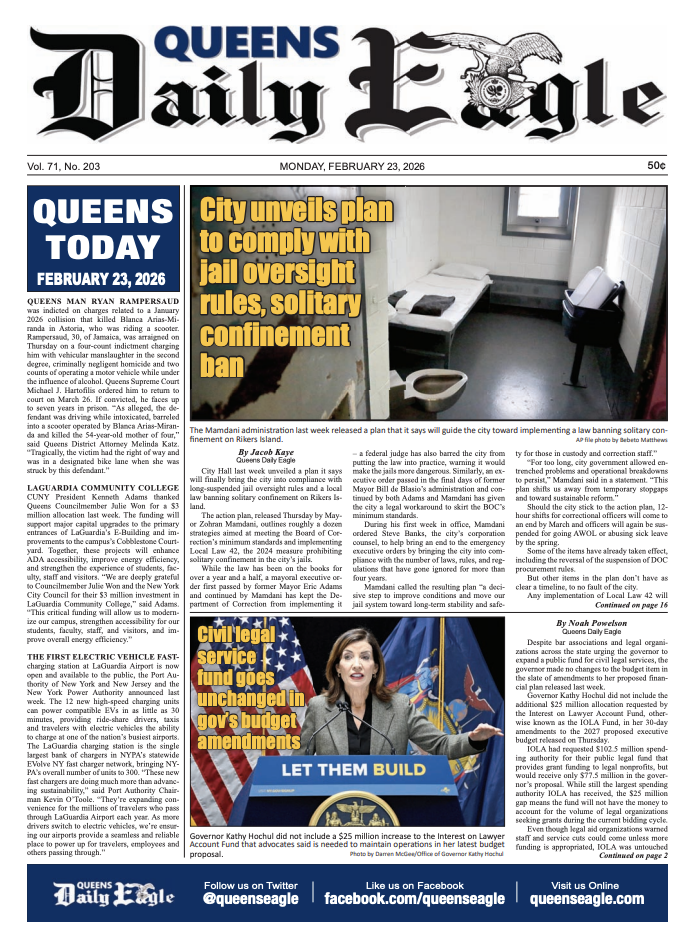Rikers Island Welcome Station Connects People With Community, Services
/By Clarissa Sosin
Rikers Island has a stench. It hangs over the people incarcerated there once they get out.
This is why Akeem Browder, an activist and former mayoral candidate, was so excited by the toiletries in the portable toilet on the corner of 19th Avenue and Hazen Street in Queens, just yards away from the entrance to the bridge to Rikers Island.
“If you've ever had a long stay or short stay, that smell is something,” said Browder who called the stench traumatizing. Browder became an activist when his brother, Kalief Browder, committed suicide after spending three years in Rikers Island after not being able to afford bail for a crime he didn’t commit.
“Someone's coming home they want to hurry up and go see to their family, and their friends,” he said. “But before leaving at least they can get clean, freshened up and also the other stuff that we're giving.”
Grand opening of the Mass Bail Out Welcome Center outside of the Elmhurst, Queens entrance to Rikers Island. Some attendees pictured include Borough President Melinda Katz (center), Council Member Jumanne D. Williams of District 45 (center right) and Council Member Costa Constantinides of District 22 (center left). // Eagle Photo by Clarissa Sosin
The portable toilets are part of the Mass Bail Out Welcome Center, a volunteer run resource center housed in a trailer just outside the entrance to Rikers Island in Elmhurst.
The center officially launched on Saturday morning with a ribbon cutting hosted by Queens Borough President Melinda Katz and attended by Council Member Jumaane D. Williams of District 45, Council Member Costa Constantinides of District 22 and representatives of organizations like 696 Build Queensbridge, Rock Safe Streets, Fathers Alive In The Hood and other community leaders and activists.
Previously housed at The Fortune Society’s Long Island City office, the mobile center quietly opened earlier this month and seeks to help people recently released on bail and connect them with services in the community.
“They're basically told, at this moment, to tuck and roll, go find where you need to be, and have the resources to get there on your own,” said Queens Borough President Melinda Katz during the ribbon cutting ceremony. “I can't think of a more inhumane way to get out of incarceration before you’ve even been tried.”
The center is part of Robert F. Kennedy Jr. Human Rights’ Mass Bail Out Action, a month-long effort to bail out as many women and children from Rikers Island as possible.
Using volunteers to physically go and post bail, the Mass Bail Out’s goal is to decrease the number of people in New York City’s jails and expose what many activists say are the flaws of a broken cash bail system that disproportionately incarcerates the poor.
“The predators like Harvey Weinstein are allowed to walk free,” said Glenn Cantave, the founder of Movers and Shakers NYC, a coalition that uses virtual and augmented reality for direct actions and advocacy. “It's clear that it’s just a case of the haves and the have nots.”
Cantave said he plans to take part in the Mass Bail Out and post bail for someone next week.
A child stands in the doorway of the Mass Bail Out Welcome Station Trailer. // Eagle Photo by Clarissa Sosin
By connecting people released from Rikers Island with services right when they get out, the organizations involved hope to mitigate some of the factors that get in the way of people turning their lives around such as homelessness, addiction, and unemployment.
Roslyn Mason of Rock Safe Streets, a sheltering arms anti-gun violence organization, emphasized the importance of ground-level work that helps people feel connected to the community. Mason said this center is an example of efforts to build relationships and changing norms within the community.
“Our communities feel like it's normal for the gunshots to rain,” Mason said. “We have to show our community that we are here, that we are, we are going to be consistent, and we want to help them in any way that we can.”
The center will open 24 hours a day, seven days a week with volunteers working four hour shifts said K. Bain, the founder of 696 Build Queensbridge, one of the organizations helping run the welcome center. He said there has been a lot of community support.
“This is the beginning of a movement,” Bain said.





